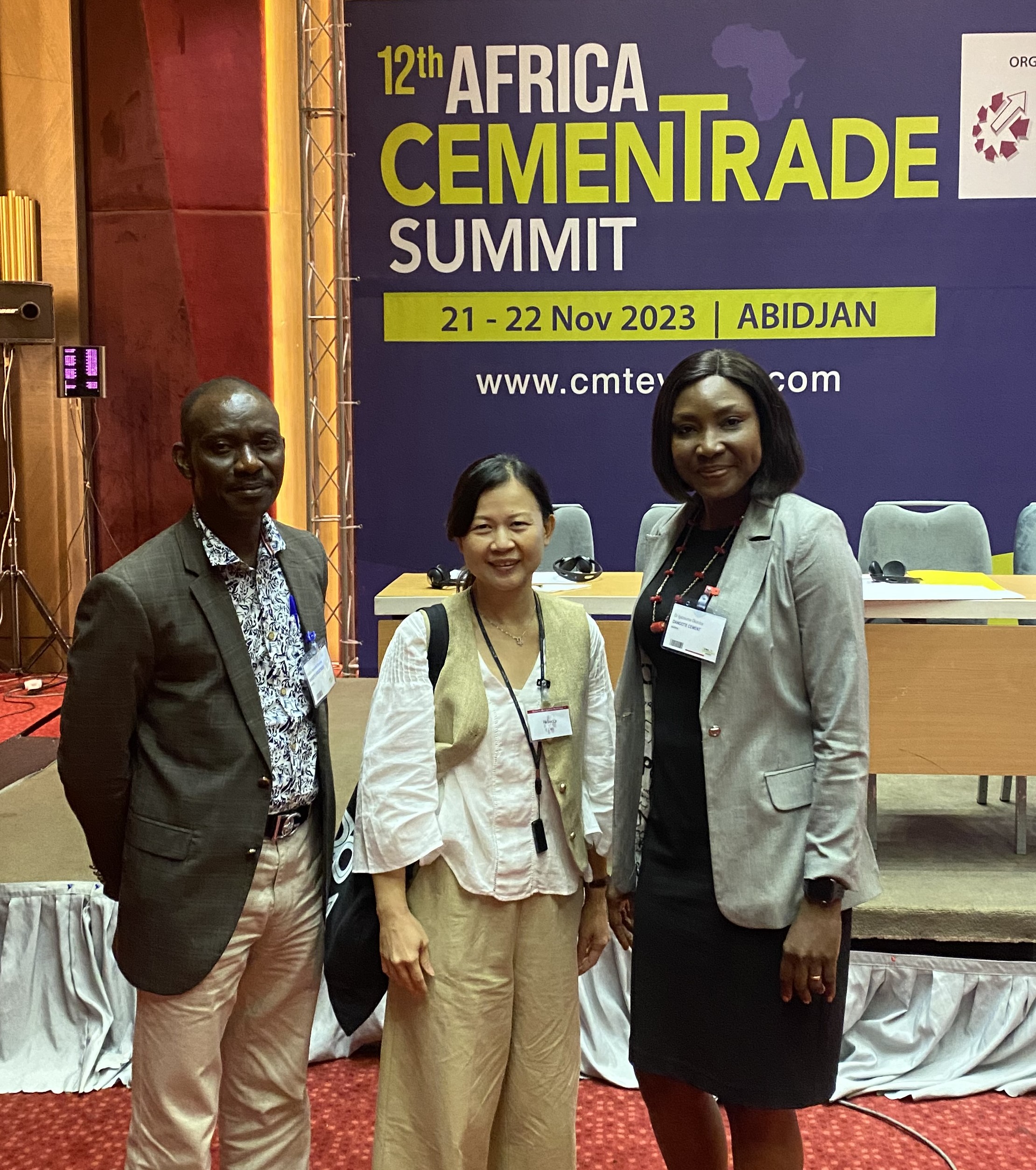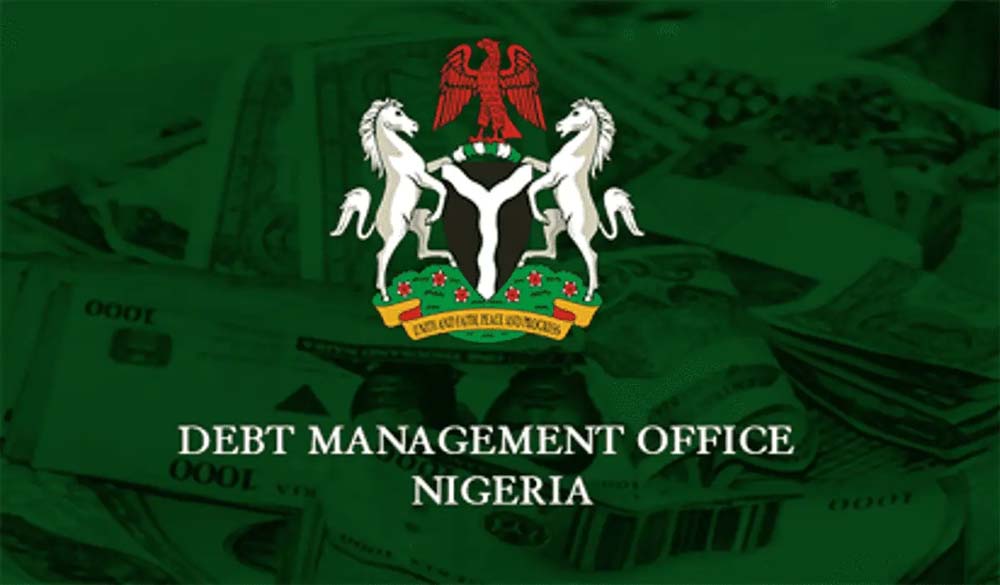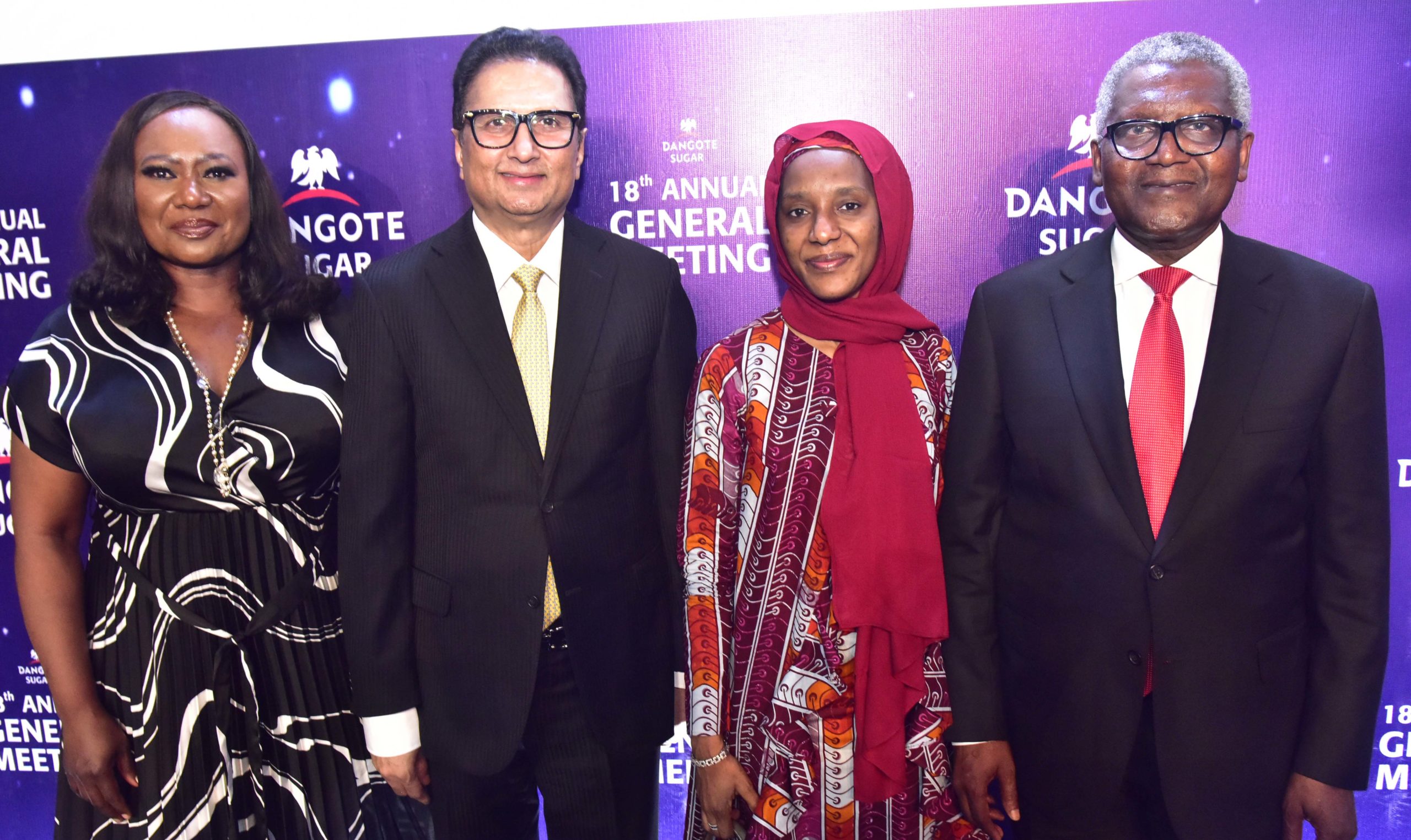Business
How Dangote Cement Tackles Africa’s Waste, Climate Change Issues

. . . Africa Cement Trade Summit Opens In Abidjan
The Group Managing Director of Dangote Cement Plc, Arvind Pathak has opened up to industry players on how the company is at the forefront to save the environment through sustainable production of cement with the utilisation of Alternative Fuels (AF).
He made the disclosure at the 12th Africa Cement Trade Summit (ACTS), which kicked off in Abidjan, Cote d’Ivoire.
According to Pathak, cement production is an energy-intensive process which consumes thermal energy of about 3.3GJ/tonne of clinker produced, and its electrical energy consumption is in the region of about 90 – 120kWh/tonne of cement.
He maintained that decarbonisation was no longer an option but a necessity, with the use of alternative fuels, such as municipal, agricultural, and industrial wastes, in the place of fossil fuels, which have been effective in emissions reduction.
Pathak was delivering a paper titled “Utilisation of Alternative Fuels as a Strategy for Sustainable Cement production in Africa” at the Summit organised by the Singapore-based Center for Management.
The summit had in attendance cement companies’ Chief Executives, Cement Industry Service Providers and other critical sector stakeholders from across the world.
According to the Dangote Cement CE, who was represented by the Group’s Head of Sustainability, Dr. Igazeuma Okoroba, AF as opposed to fossil fuels emit less CO2 when combusted and that agricultural biomass are known to be carbon neutral.
He noted that with the level of cement consumption worldwide reaching 4.2 billion tonnes in 2020 and as population is projected to grow by 12‑23% in 2050 due to rapid urbanisation, the demand for cement will also grow, therefore the need to prioritise the inclusion of alternative fuels in fuel mix is crucial to address climate change concerns.
He said the cement industry, which provides a vital material to meet Africa’s infrastructure deficit, generates 7% of the world’s CO2 emissions as the cement value chain involves the intensive use of energy for raw materials’ mining, crushing, mixing, drying, firing, clinker grinding, packaging and dispatch to customers.
This, he posited, places a critical demand on fuel sourcing and controlled energy usage, as almost every stage of the cement value chain produces CO2 emissions, with the bulk of emissions emanating from the firing process during clinker production in the kiln.
“From being the world’s largest bulk cement importers to self-sufficiency and now net exporters of cement to other countries, it is therefore not unexpected that Dangote Cement is one of the pioneer African companies in decreasing CO2 emissions through a fuel substitution strategy. Through reporting, Dangote Cement responds to the evolving environmental, and social challenges by disclosing investment priorities and progress on projects that address the issues.
“We also leverage sustainability reporting to ignite market growth. As part of this commitment, we began reporting in 2020 and received an initial rating of C on climate change. As the company’s actions improved, we rose to a B- and then achieved a B+ rating in 2022,” Pathak added.
According to him, “As a multinational present in many African countries, Dangote Group aims to become a regional leader in sustainability. Dangote Cement is dedicated to environmental sustainability and combating climate change. We have implemented a robust Climate Change Policy that aligns our operations with global climate goals. The Environmental Pillars of the company define the ways of entrenching sustainability by identifying, measuring and mitigating actual and potential environmental impacts of operations.”
Pathak revealed that the company’s goal is to continuously improve performance on energy efficiency, waste management, water consumption, and monitoring of greenhouse gas emissions. “As an African business, we believe that utilising alternative fuel is a critical decarbonisation lever for industries to address the continent’s climate change mitigation. Dangote Cement’s Alternative Fuel (AF) Project is an example of this mindset,” he said.
The Dangote Cement boss told his audience that in the wake of global climate shocks, decarbonisation is no longer an option but a necessary component to future-proof businesses in a rapidly changing world. He added that businesses must set clear and detailed short, medium, and long-term targets and decarbonisation strategies for each transition target.
“Indications are that companies that are likely to thrive in this new wave of climate consciousness are not only decarbonising but also thinking about how to shift the business into faster-growing areas.
“Our Board maintains oversight over sustainability reporting, which is essential for corporate success. Through this reporting, Dangote Cement responds to evolving environmental and social challenges by disclosing sustainability commitments and actions. As part of this commitment, we began reporting to the CDP in 2020 and received an initial rating of C on climate change. As the company’s actions improved, we rose to a B- and then achieved a B+ rating in 2022.
“We are one of the pioneer African companies in decreasing CO2 emissions through a fuel substitution strategy. This initiative focuses on substituting fossil fuels by using alternative fuels. The consequences of this strategy are already visible. Biomass and alternative fuels are said to have a lower environmental impact compared to conventional fuels but may produce some emissions.
“Dangote Cement’s efforts in providing access to adequate, safe, and affordable housing are consolidated in the Dangote seven sustainability pillars, themed “The Dangote Way”. Through the drive of the leadership on sustainability, we have a compelling challenge for deliberate programmes for the substitution of fossil fuels, with AF. This also contributes to Nigeria’s CO2 reduction commitments by 2060″, he added.
While admitting that the emissions challenge will tarry in the industry for a while, Pathak expressed optimism that the cement industry will continue to contribute to tackling climate change, besides the consequential benefit of CO2 emission abatement.
He noted that as urbanisation contributes to increase waste generated, Sub-Saharan Africa is predicted to become the prevalent region globally in terms of total waste generation, if the current trend persists. Low-income countries have also been at the receiving end of hazardous wastes from waste trades, which further compounded the waste situation.
“The Stockholm Convention on Persistent Organic Pollutants (POPs) which is a global treaty to protect human health and the environment from highly dangerous chemicals, describes the firing hazardous waste in cement kilns as the best available technique for treating dangerous waste because most cement kilns possess the conditions and equipment to treat hazardous waste. This is where Dangote Cement provides the solution to Africa’s waste problem”, he asserted.
“Beyond the management of Africa’s waste, AF is a lever to decarbonise cement manufacturing process. Regarding cost and policies in Africa, other options are improving the energy mix with increased use of transitional fuels, efficiency in cement production, design optimisation, and decarbonisation via CO2 sinks, such as reforestation and renewable energy for power generation,” he concluded.
Business
FG Reiterates Commitment To Utilise Gas For Economic Growth, Prosperity

. . . Tinubu Lauds NNPC Ltd, Partners Over Three Commissioned Gas Projects
In line with its renewed hope agenda, the Federal Government has reiterated determination to utilize Nigeria’s abundant gas resources towards revamping her industrial growth and kick-starting economic prosperity.
Biztellers reports that President Bola Ahmed Tinubu made the assertion while commissioning three critical gas infrastructure projects executed by the NNPC Limited and its partners in Ohaji-Egbema, in Imo State and Kwale, in Delta States, on Wednesday.
The three projects commissioned include the expansion of the AHL Gas Processing Plant, the ANOH Gas Processing Plant and the 23.3km ANOH to Obiafu-Obrikom-Oben (OB3) Custody Transfer Metering Station Gas Pipeline Projects.
He said, “It is pleasing that approximately, 500MMscf of gas in aggregate would be supplied to the domestic market from these two Gas Processing Plants, which represents over 25% incremental growth in gas supply.
“In practical terms, this translates into more gas to the Power Sector, Gas-Based Industries, and other critical segments of the economy.”
The President pointed out that from the onset, his administration was clear of its intention to leverage on the virtually unlimited capacity of gas to deepen domestic gas utilization, increase national power generation capacity, revitalize industries, and create multiple job opportunities for economic growth.
He said aside the Presidential Compressed Natural Gas (CNG) Initiative which is aimed at moving Nigerians away from petrol and diesel as vehicular combustion fuel, significant progress has also been recorded in incentivizing gas development through Presidential Executive Orders.
While congratulating the projects partners (NNPC Limited, Sterling Oil Exploration & Energy Production Company Limited (SEEPCO) and Seplat Energy for the successful implementation of the three projects, Tinubu particularly charged the NNPC Limited to, as the national energy company of choice, sustain its relentless efforts and record more successes in the energy sector for the benefit of all Nigerians.
President Tinubu described the commissioning as a highly significant milestone for Nigeria as it demonstrates his administration’s efforts to accelerate the development of critical gas infrastructure geared at enhancing the supply of energy to boost industrial growth and create employment opportunities.
He said the projects were fully in line with the Federal Government’s Decade of Gas initiative, and his administration’s quest to grow value from the Nation’s abundant gas assets while concurrently eliminating gas flaring and accelerating industrialization.
“I wish to assure the citizenry that these are just the beginning, as the federal government is stepping up its coordination of other landmark projects and initiatives that will ensure the earliest realization of gas fueled prosperity in our country.
“Consequently, I wish to assure investors in the energy space that this is an investment enabling government and we will not relent in facilitating the ease of doing business,” the President noted.
Earlier in his address, the Minister of State for Petroleum Resources (Gas) Rt. Hon. Ekperikpe Ekpo highlighted the efforts of his ministry to continue to champion the utilisation of gas as a transition fuel as Nigeria moves towards achieving clean energy efficiency and security by 2060.
Ekpo commended the President for his leadership and support towards the success of the three projects.
In his remarks, the GCEO NNPC, Mele Kyari described the commissioning as a demonstration of Mr. President’s commitment and support to grow the domestic utilization of natural gas for power generation, as feedstock for gas-based industries and overall rapid industrialization of Nigeria on the back of the enormous gas resources in the country.
Kyari assured that as part of its mandate, NNPC Ltd remains committed to maintaining energy security by executing more strategic gas projects for the benefit of Nigeria.
Business
FG Lists N4.214bn April Savings Bonds On NGX

The Nigerian Government has listed her April 2024 Savings Bonds worth N4.214 billion on the Nigerian Exchange Limited (NGX) platform.
This was disclosed in the market bulletin signed by the Head, Issuers Regulation Department of NGX, Godstime Iwenekhai.
According to the bulletin, “Trading License Holders are hereby notified that the April 2024 Issue of the Federal Government of Nigeria (FGN) Savings Bonds was listed on Nigerian Exchange Limited (NGX) on May 13, 2024.”
Details of the Bonds include FGS April 2026, 1.228 million units valued at N1.228 billion at a coupon rate of 17.046%, while FGS April 2027, 2.986 million units amounted to N2.986 billion at a coupon rate of 18.046%.
The bonds are backed by the full faith and credit of the FGN and charged upon the general assets of Nigeria, according to the debt office.
FGN Savings Bond is issued monthly in tenors of two and three years with quarterly payment of coupons (interest) at a rate predetermined and published by the DMO every month.
The retail savings bond product was introduced by the DMO on behalf of the FGN in 2017 to democratise its activities in the bond market by making it easily accessible to Nigerians to ensure continuous development of the domestic market and bridge infrastructure deficit which has been a constraint to economic growth.
Business
JUST IN: Nigeria’s Inflation Soars To 33.69%
Nigeria’s inflation rate surged to 33.69% in April 2024, up from 33.20% in March, according to the latest data from the National Bureau of Statistics (NBS).
The Consumer Price Index (CPI) report, released Wednesday, shows a 0.49 percentage point rise within a month.
Year-on-year, the inflation rate has surged by 11.47 percentage points, compared to 22.22% in April 2023, highlighting the ongoing economic challenges and rising costs for consumers.
The report reads “In April 2024, the headline inflation rate increased to 33.69% relative to the March 2024 head line inflation rate which was 33.20%.
“On a year-on-year basis, the headline inflation rate was 11.47% points higher compared to the rate recorded in April 2023, which was 22.22%.
This shows that the headline inflation rate (year-on-year basis) increased in the month of April 2024 when compared to the same month in the preceding year (i.e., April 2023).
“Furthermore, on a month-on-month basis, the headline inflation rate in April 2024 was 2.29%, which was 0.73% lower than the rate recorded in March 2024 (3.02%).
“This means that in the month of April 2024, the rate of increase in the average price level is less than the rate of in crease in the average price level in March 2024.”
Prices of food and basic commodities have surged dramatically in recent weeks, as Nigerians grapple with a soaring cost of living and one of the nation’s most severe economic crises.
The crisis has been intensified by the government’s removal of petrol subsidies and the unification of forex windows.
The naira, which had appreciated against the dollar in April, has since plummeted from about N1,100/$1 to roughly N1,500/$1.
Following the latest inflation report from the National Bureau of Statistics (NBS), the Monetary Policy Committee (MPC) of the Central Bank of Nigeria (CBN) is anticipated to review the country’s interest rate, currently set at 24.75%.












